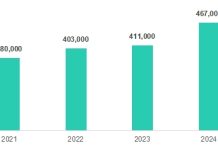
Amazon Web Services, Inc (AWS), an Amazon.com company, has found that the need for digital skills training became more acute during the pandemic, with 91 percent of workers in Singapore reporting they need more digital skills – the ability and knowledge to apply digital technologies for tasks in the workplace – to cope with changes in their jobs due to the Covid-19 pandemic.
The company said in a research report that over the next year, the number of Singapore workers requiring digital skills training for their jobs is projected to increase by 647,000, representing 29 percent of Singapore’s workforce. Despite this, only 24 percent of employers in Singapore have a training plan in place, which could affect their competitiveness in such areas as productivity, innovation, and employee retention.
The “Building Digital Skills for the Changing Workforce” report, prepared by strategy and economics consulting firm AlphaBeta, and commissioned by AWS, surveyed 1,037 digitally skilled workers in both technology and non-technology roles, and 314 employers in Singapore, with representation from public, private, and non-profit sectors of different sizes and industries.
The report also found that the ability to use cloud-based tools, such as cloud developer tools, as well as online collaboration, accounting, and customer relationship management (CRM) software, will be the second most in-demand skill required by employers by 2025, after cybersecurity skills.
It also highlights the need for more advanced cloud computing skills, with the ability to migrate on-premises facilities to the cloud and cloud design architecture skills predicted to be among the top 10 in-demand digital skills by 2025 in Singapore.
Sixty five percent of workers in Singapore feel they will require training in cloud-related skills by 2025 to progress in their careers. Among these workers who feel that they require training in cloud-related skills, 45 percent feel that they need to learn how to make use of cloud-based tools in their work, 30 percent feel that they will require training in migrating on-premises facilities to the cloud, and 26 percent will require cloud architecture design skills.
Other advanced cloud skills such as machine learning, will be in high demand in businesses from healthcare to agriculture, fintech to media and entertainment, emerging as the 4th most demanded digital skill by employers by 2025.
Employers who support skills training programs see significant benefits, with 87 percent reporting improved employee productivity, 85 percent stating they were able to fast-track their digitisation goals, 84 percent achieving cost efficiencies, 81 percent reporting higher employee retention, and 83 percent seeing increased revenue.
Genevieve Lim, Director for APAC, AlphaBeta (part of Access Partnership), said, “While the need for digital skills has been growing for years, our research shows that job changes due to the Covid-19 pandemic have accelerated the need for more training for both tech and non-tech workers on digital capabilities in Singapore.
“Organisations have accelerated their digitisation process to cope with the pandemic and ensure their long-term competitiveness. Transitioning into a digital-first economy will help countries’ recovery from Covid-19 and secure a stronger economic future. There is an urgent need for governments to work together with employers, training providers, and workers to meet these diverse and ever-growing digital learning needs.”
AWS is focused on breaking down barriers to help solve this challenge and is investing hundreds of millions of dollars globally as part of a global commitment to provide free cloud computing skills training to 29 million people. AWS offers over 500 free digital training courses, available to anyone with a desire to learn and an internet connection.
AWS also works directly with customer and partner organisations to help them upskill their employees. Comprehensive skills enablement programs are designed to build cloud skills to help develop teams so they can more effectively innovate in the cloud. In Singapore, the firm run programs with organisations such as Zalora and RHB Bank.














